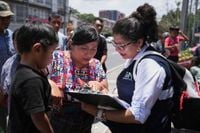In a dramatic turn of events that has sent ripples through the U.S. immigration system, a federal judge has indefinitely blocked the Trump administration from deporting hundreds of Guatemalan migrant children who arrived in the United States unaccompanied. The ruling, delivered on September 18, 2025, by U.S. District Judge Timothy J. Kelly, comes after a tense Labor Day weekend operation in which the administration sought to swiftly remove children living in government shelters and foster care, raising serious legal and ethical questions about the treatment of some of the country’s most vulnerable newcomers.
According to reporting from the Associated Press and El Paso Times, the administration’s late-night deportation attempt began on August 30, 2025, with Immigration and Customs Enforcement (ICE) contractors picking up Guatemalan children from shelters and foster homes. The government had initially identified 457 children for possible removal, eventually narrowing the list to 327. On August 31, 76 children—some as young as 10 and as old as 17—were placed aboard ICE-chartered planes in El Paso and Harlingen, Texas, poised to return to Guatemala in what was described as a first phase of the operation.
The administration claimed the effort was intended to reunify children with parents who wanted them back in Guatemala. But as Judge Kelly noted in his 43-page order, “That explanation crumbled like a house of cards about a week later. There is no evidence before the Court that the parents of these children sought their return.” A report from Guatemala’s Solicitor General’s office, first reported by Reuters, revealed that officials could not locate most of the children’s parents, and those who were found had not requested their children’s return.
In a statement to the court, Homeland Security Assistant Secretary Tricia McLaughlin defended the administration’s actions, insisting, “This judge is blocking efforts to REUNIFY CHILDREN with their families. Now these children will have to go to shelters. All just to ‘get Trump.’ This is disgraceful and immoral.” White House spokesperson Abigail Jackson added, “The lower court wrongly interjected itself into this effort” of reuniting families. Despite these assertions, Judge Kelly found no factual basis for the administration’s claims, and the government ultimately walked back its original justification, instead arguing that it had the right to return children in its care and was acting on behalf of the Guatemalan government.
The legal battle came to a head when advocates for the children, alerted to the impending removals, rushed to federal court. They submitted a whistleblower account suggesting that many of the children identified for deportation were likely victims of child abuse, death threats, gang violence, and human trafficking. “The court saw through the government’s repeated misrepresentations of critical facts to try to justify the indefensible targeting of vulnerable children who would have faced danger if forcibly sent to other countries,” said Efrén C. Olivares, vice president of litigation & legal strategy at the National Immigration Law Center, in a statement reported by the Associated Press.
As the planes sat on the tarmacs in Texas, U.S. District Court Judge Sparkle Sooknanan, responding to an emergency request from advocates, issued a ruling that prevented the children’s immediate deportation. The children were taken off the planes an hour after the ruling and returned to the custody of the Department of Health and Human Services’ Office of Refugee Resettlement. Mishan Wroe, directing attorney at the National Center for Youth Law, described the children’s reaction: “Our clients were terrified—many had tear-soaked faces and some were visibly shaking with fear.”
Judge Kelly’s order not only extended the temporary injunction that was set to expire but also granted a preliminary injunction, offering indefinite protection against deportation for the Guatemalan children. The administration retains the right to appeal the decision, but for now, the children are shielded from removal as their immigration cases proceed. The judge also rebuffed advocates’ calls to extend the injunction to children from other countries, though he warned that any similar attempt to remove those children would “likely be unlawful.”
Legal experts and advocates have hailed the ruling as a critical victory for the rights of unaccompanied minors. Aaron Reichlin-Melnick, a senior fellow at the American Immigration Council, told the El Paso Times, “What Judge Kelly’s decision makes clear is that what the Trump administration was doing was illegal and their justifications were false. This was not about reuniting children and parents. This was about deportation. This is yet another case where the Trump administration was engaged in extraordinary behavior in an effort to avoid judicial review.”
Ursula Róldan, an immigration expert and researcher at Guatemala’s Rafael Landivar University, praised the decision, stating, “I believe it was the correct action based on national and international legislation to stop the deportation of unaccompanied migrant children, because it violates the principle of priority for the child. These children have no protection in their country of origin … I believe the law should prevail, as well as the principles of human rights at the international level.”
The legal foundation for the ruling rests on the Trafficking Victims Protection Reauthorization Act (TVPRA) of 2008, a landmark law designed to safeguard unaccompanied migrant children in U.S. government custody. Judge Kelly determined that the administration’s actions likely violated the TVPRA, as well as longstanding legal procedures intended to protect young migrants from being returned to countries where they might face harm.
For families caught in the turmoil, the ruling has brought both relief and uncertainty. Bertilda López, whose 17-year-old son was among those slated for deportation, shared her conflicted feelings: “As a mother I want him to be well, whether that’s sending him (home) or him being locked up there. Maybe it’s better that they send him back because he’s really sad. The way things are there (in the U.S.), it bothers me that my son is locked up.” Meanwhile, Elisabeth Toca, the boy’s sponsor, expressed hope that he would be allowed to stay and “give him a better life.”
In the wake of Judge Kelly’s decision, the Guatemalan government declined to comment, describing the matter as an internal U.S. justice process. Meanwhile, advocates remain vigilant, with temporary restraining orders in place in Arizona and Illinois for similar cases, though those are narrower in scope. The Washington case stands out for its broader impact, affecting hundreds of children and setting a precedent for how unaccompanied minors are treated under U.S. law.
As the debate over immigration policy and the rights of migrant children continues to roil the nation, this case underscores the profound consequences of government action—and inaction—on the lives of children seeking safety and hope far from home.


